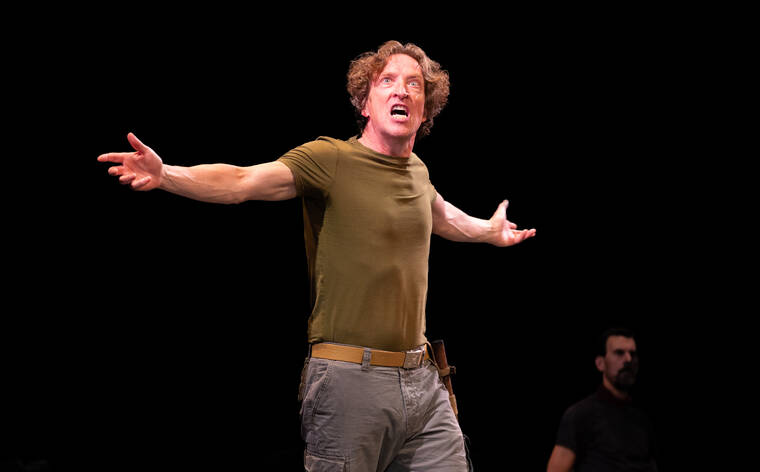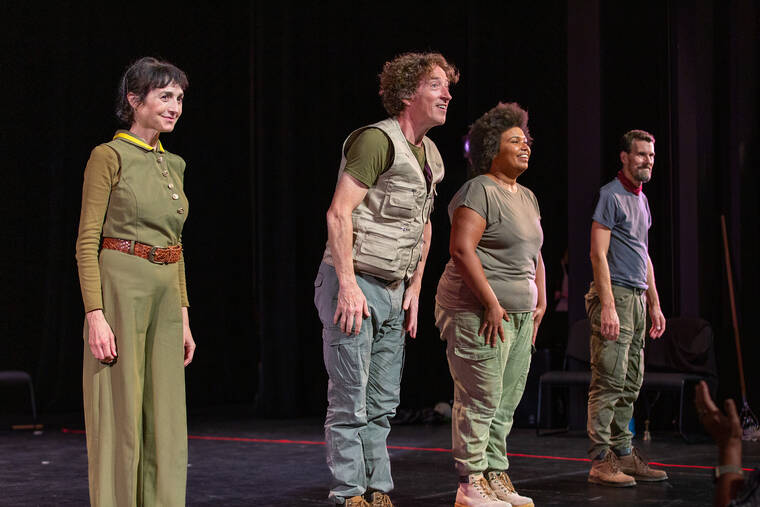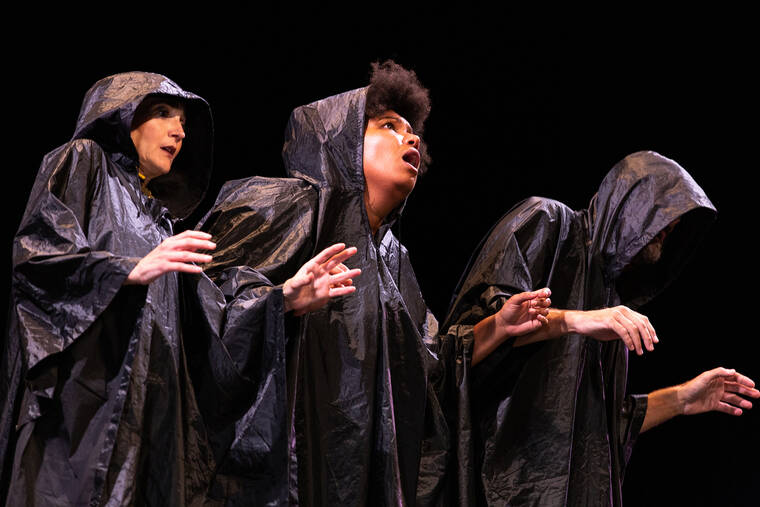Without the aid of microphones and with only limited props and minimal costume accessories, the five-person touring company known as the Actors From The London Stage (AFTLS) gave a stellar performance of Shakespeare’s classic Macbeth on Oct. 22 at the Kahilu Theatre.
This production featured: Roger May (Macbeth/Old Man/Captain); Claire Redcliffe (Lady Macbeth/Donalbain/Ross/ Fleance/Second Witch); Annabelle Terry (Banquo/Lennox/ Menteith/Scottish Doctor/Porter/Old Siward/Hecate); Anne Odeke (Malcolm/Lady Macduff/First Witch/First Murderer); and Michael Wagg (King Duncan/Macduff/Third Witch/Second Murderer/English Doctor).
The concept for actors performing stripped-down versions of popular plays was developed nearly fifty years ago in a London pub called the Dirty Duck. “Several actors, including [a pre-Star Trek] Patrick Stewart, had just finished a play at Royal Shakespeare Company,” explained Roger May. “I think they were moaning about the director and saying they could do a better job. An American academic at the next table, who heard this, got involved and offered them the opportunity to tour America performing and offer acting classes.”
The catch was it could only be five actors (enough to fit in one car), one suitcase that would hold all the props and costumes, and no director. “I love it because it encourages creativity and a different way of looking at things so that you need to use your imagination to work out situations like how to create a banquet table,” noted May. It’s also about the actors taking ownership rather than being told what to do. When you have five creative voices, we find fantastic new things to try and bring to the stage.”
A great example of this creativity happens during the banquet scene where Macbeth sees the ghost of Lord Banquo sitting in his place at the table. “The table” is a large piece of red cloth, and when stretched out and held taught by two actors, it resembles a long formal table. When Macbeth’s back is turned, the tablecloth is flipped up, and Banquo appears/disappears when lowered. As the fabric is pulled back, Banquo’s body cleverly takes shape as he goes into rage mode. It was probably one of the two-hour production’s most challenging yet compelling moments.
Before touring, the actors rehearse in London for five weeks and then another week at the University of Notre Dame in Indiana. “There’s no set designer, no stage manager, just the five of us, and we control the budget,” Michael Wagg said. “It’s quite intense!”
While thick British/Scottish accents delivered in rapid-fire dialogue may have made it difficult for some in the audience to follow the plot, the presentation became more about the mechanics of how these versatile actors, portraying multiple roles (some with only four lines), could interpret the chilling tale of power, envy, and ambition.
An autoharp is eerily strummed for sound effects, while the hollow sound of a Native American Shaman drum is used for dramatic scenes. The actors tucked away hats behind their backs, hid glasses in their pockets, and employed magnets and Velcro to help them seamlessly change characters on the fly. Actor Annabelle Terry later admitted during Q&A that her mother accompanied her on this tour and assisted as a seamstress.
During their week-long stay on the Big Island, AFTLS also appeared at UH-Hilo’s Performing Arts Center and at special presentations for the students at Kohala and Honoka’a high schools. “We acted out a few selected moments from Macbeth, including a lovely dance and a little kiss which caused an uproar with the students,” Claire Redcliffe said. “After a workshop, some asked about the kissing scene and if I was married to Claire, and I said, ‘No, I have a wife,’’’ added May. “They couldn’t believe it and hadn’t experienced that before.”
“We explained that we’re not teachers but actors and how they might use some of these skills in presentations or other areas they are studying,” continued Redcliffe. “Our job is to make Shakespeare less unattainable and try to unlock something that demystifies it. It’s a lovely mix of action and beautiful poetry.”






